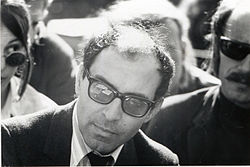The legendarily obtuse Nouvelle Vague (New Wave) French director,  Jean-Luc Godard, premiered his new and perhaps, last movie at the Cannes Film Festival on May 17. Entitled “Film Socialism“, it has created quite a whirlpool of chatter due to its densely packed themes, images, and a multilingual cast whose lines are subtitled into “Navajo English.”
Jean-Luc Godard, premiered his new and perhaps, last movie at the Cannes Film Festival on May 17. Entitled “Film Socialism“, it has created quite a whirlpool of chatter due to its densely packed themes, images, and a multilingual cast whose lines are subtitled into “Navajo English.”
First, a little background on Godard and the French cinema culture. In France, le cinema is considered a high art form and is discussed with the same fervor as philosophy, politics and the French language. In Paris, there are over 100 movie theaters, ranging from the 10-screen mega multiplex playing the latest Hollywood blockbusters to the 25-seat sous-sol (basement) art houses playing foreign, classic and truly independent movies that would never see the light of the screen in the States.
In one day of cine-trolling within one single Parisian arrondissement, you could see, for example, a film from Mali by a first-time director, a $300 million Hollywood thriller, a classic Italian spaghetti western, a French comedy, and a collection of animated short films from Japan.
As for Godard, he literally blew onto the movie scene with A bout de souffle (Breathless) in 1960 (this original version is not to be mistaken for the inferior Hollywood remake of 1983). Since then, he’s directed (or co-directed) over 60 feature films. Many of his films have political overtones and are mired in controversy — some of them have even been banned or boycotted. He’s alternatively revered, hated, dismissed as a has-been, adored as an innovator, but always seems to be the center of discussion, especially when he releases a new film.
With “Film Socialism,” Godard continues his controversial streak with a movie about a group of people on a cruise ship (full disclosure: I have not seen the film, just the trailer and the commentary by bloggers and critics). As the title suggests, there is a political aspect to the movie, although what the film truly means has been anyone’s guess (you yourself can try and understand Godard’s thoughts on the film). Critics have said it was anything from “dribble” to the best film shown at Cannes (Irish critic Mark Cousins’ assessment).
The film’s characters are from a variety of countries, hence the need for the now somewhat infamous subtitles. According to the BBC, Godard himself chose to describe the language of the subtitles as “Navajo English” — a staccato pidgin of sorts.
You can get a taste for the movie via the trailer below. Note that this video shows English subtitles that are not Godard’s; they are supplied by a translator not associated with the film. You’ll have to see the movie in the theaters in order to get the full experience of “Navajo English” subtitles.
What is Godard thinking? The “Navajo English” language can be viewed as derogatory due to stereotypes of Native American speech popularized in old westerns. Or, conversely, it could be his way of giving homage to the Navajo. Perhaps he was minimizing sentences to arrive at a raw meaning, forcing the audience to think of ideas rather than being limited by the written word. Perhaps they are “keywords” intentionally left obscure because that’s how languages (and people) are — subtle, difficult, beautiful. Perhaps it’s a political statement — giving everyone the same tone in all languages. Perhaps it’s just Godard being Godard.
Just how will these subtitles be translated for, say, a Spanish audience is anyone’s guess. The original speech may be in Russian, then it’s already been translated into “Navajo English” and then that needs to be translated into Spanish. Or will the translators work directly from the Russian and try to create an equivalent to pidgin Spanish. (This is rarely done in business translation; usually non-English “source” text is first translated into English and then into the final target language, be it Spanish, Japanese or Swahili).
Whatever the case, the movie will create controversy and buzz in any language. If you see the film, just make sure you have a clear sight line to the subtitles. Or, just ignore them and experience a Godard film in a whole new way.






Power your strategic growth
Go beyond tactical localization with tailored, strategic solutions that resonate locally and drive growth globally.
Get started